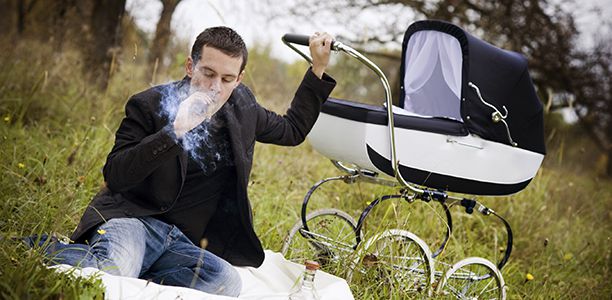Research led by Dr Costan Magnussen has shown that children exposed to parental smoking in childhood had approximately twice the risk of having plaque in their carotid artery 26 years later as did those whose parents did not smoke in childhood. Arterial plaque is linked to heart disease.
Dr Magnussen also found that children of parents who smoked but exercised good smoking hygiene (i.e., smoked well away from their children) had significantly lower rates of carotid plaque in adulthood compared with children of parents who smoked but exercised poor smoking hygiene (i.e., smoked inside the home, car, or in the vicinity of their children).
The research has been published today in Circulation, a journal of the American Heart Association. Mr Henry West, a Menzies Honours student supervised by Dr Magnussen, is the other lead author on the paper.
This work builds substantially on a paper published last year by Dr Seana Gall, who is an author on this paper and, with Dr Magnussen, a member of the Cardiovascular Epidemiology Research Group at Menzies. Dr Gall’s paper in the European Heart Journal in February 2014 showed that passive smoking in childhood was associated with long term damage to the structure of arteries in adulthood.
“What we have been able to establish is that the risks to children from passive smoke extend well into their life and also that these risks are not confined to respiratory illnesses. The impact on cardiovascular health in adulthood is significant,” Dr Magnussen said.
Dr Magnussen and colleagues tracked participants in the Cardiovascular Risk in Young Finns Study who had blood samples taken in 1980 when they were aged between three and 18 years. Carotid ultrasound data collected from the same people in adulthood, in 2001 and 2007, was then compared to childhood blood cotinine levels (cotinine is a biomarker of passive smoke exposure) and information from questionnaires on parental smoking behaviour.
Regardless of other factors, the risk of developing carotid plaque in adulthood was almost two times (1.7) higher in children exposed to one or two parental smokers compared to children of parents who did not smoke.
Researchers stressed that to provide the best long-term cardiovascular health for their offspring, parents should not smoke. “For parents who are trying to quit smoking, they may be able to reduce some of the potential long-term risk for their children by actively reducing their children’s exposure to second-hand smoke (for example, not smoking inside the home or car),” said Dr Magnussen, who is also adjunct professor of cardiovascular epidemiology at the University of Turku in Finland.
“Not smoking at all is by far the safest option.”
Globally, more than 50% of children are exposed to passive smoking, most of them at home.
(Source: University of Tasmania, Circulation)










